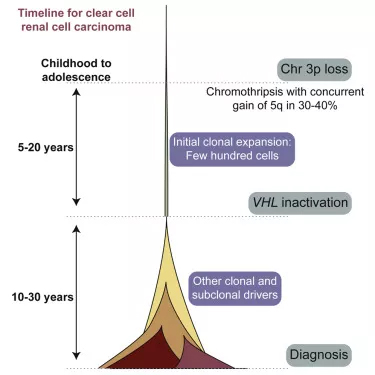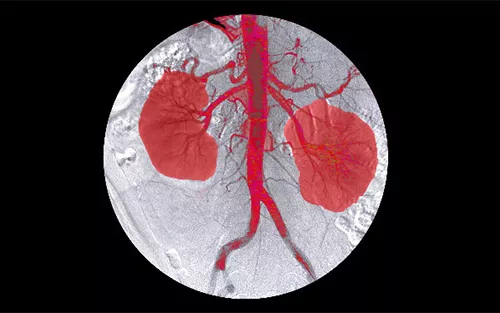Release date: 2018-04-17
In a recent study published in Cell, scientists identified the earliest key genetic changes that led to kidney cancer. Surprisingly, the first key genetic change occurred in children or adolescents. After 40 or 50 years, some of the resulting cells develop into kidney cancer.

Image source: Cell (DOI: https://doi.org/10.1016/j.cell.2018.02.020)
The result of "Timing the Landmark Events in the Evolution of Clear Cell Renal Cell Cancer: TRACERx Renal" (Thesis 1) was published on April 12th, by Dr. Peter J. Campbell and Francis Crick of the Wellcome Trust Sanger Institute. Professor Charles Swanton is the co-author of the paper.
1. The first mutation occurred in adolescence
To gain a deeper understanding of what initiated kidney cancer, Professor Swanton and others dug up the genome of kidney tumors to find the first genetic change. Specifically, scientists sequenced and analyzed the entire genome of 95 kidney cancer tumors from 33 patients.
It was found that the first important genetic alteration or driver mutation that led to kidney cancer occurred very early, and on average, occurred in adolescence. Of the more than 90% of kidney cancer patients surveyed, the first mutation was the loss of chromosome 3 (chromosome 3p).

Image source: Cell
Dr. Thomas Mitchell, co-first author of the paper, said: "We found that the genetic alteration that initiates kidney cancer in most people is the deletion of the short arm of chromosome 3, which carries several tumor suppressor genes. In addition, about 35 - 40% of patients also acquired chromosome 5 (chromosome 5q) during a process called 'chromothripsis, chromosome breakage and rearrangement, which can cause multiple mutations at the same time."
2, dormancy for decades, need further mutations to develop cancer
The scientists also found that only a few hundred cells initially had these genetic changes, and it is likely that most of us have some of these "harmful" cells in the kidneys. However, these cells will remain dormant for the next forty or fifty years and will not develop into kidney cancer unless triggered by further mutations. Risk factors that can contribute to the development of these cells into cancer include smoking, obesity, and inherited risk of kidney cancer.
Dr. Campbell said: "Now, we finally figured out what was the initial genetic change that led to kidney cancer and when these changes occurred. It turned out to be related to kidney cancer 40 to 50 years before the cancer was diagnosed. Genomic events have occurred. The first cancer 'seeds' have been planted during childhood or adolescence."

Image credit: Freeimages.com/Adam Ciesielski
Professor Swanton said: “It is critical to understand how cancer develops and evolves over time. This information will point the way to the development of new predictions and treatments. We hope that this outcome will help guide surgery and other medical interventions in the future.â€
3. Two other related Cell papers on the same day
It is worth mentioning that in addition to the above results, Professor Swanton also published two other related papers in Cell magazine on the same day: Deterministic Evolutionary Trajectories Influence Primary Tumor Growth: TRACERx Renal (Thesis 2); Tracking Cancer Evolution Reveals Constrained Routes to Metastases: TRACERx Renal (Paper 3).
According to the BBC, scientists are currently investigating the tools used in this study in cancers other than kidney cancer, including lung cancer. Dr. Samra Turajlic, co-first author of the three papers at the Francis Crick Institute, said: "There is no doubt that these tools will work for other types of cancer."
The researchers believe that these findings provide an opportunity to develop early detection and early prevention strategies for kidney cancer, especially in high-risk populations. “These studies are groundbreaking results,†said Harpal Kumar, chief executive of Cancer Research UK.
Source: Bio-Exploration (micro-signal biodiscover)
All safety-conscious parents lookout for a solution that can track their child`s school bus location in real-time, and that`s where a School Bus GPS Tracking System comes in.
A real-time bus tracking system provides you the live GPS location of the school bus and tells you whether your child has boarded or de-boarded the bus or not, and at what time.
All this information can be accessed by parents from anywhere, be it their home or workplace.
That`s the whole beauty of a real-time tracking system!
Complete Safety and Security of Kids:
Transportation safety is the primary concern of parents.
The Best school bus tracking system allows school administrators to keep a tab on driver`s speed limits and provides an option to contact your drivers on duty. This gives peace of mind to parents in ensuring the safety and security of their kids.
Monitor assist system,Vehicle tracking system,,Vehicle remote monitoring system , Vehicle backup camera system,Vehicle driver monitoring system
SHENZHEN SANAN TECHNOLOGY CO.,LTD , https://www.sanan-cctv.com